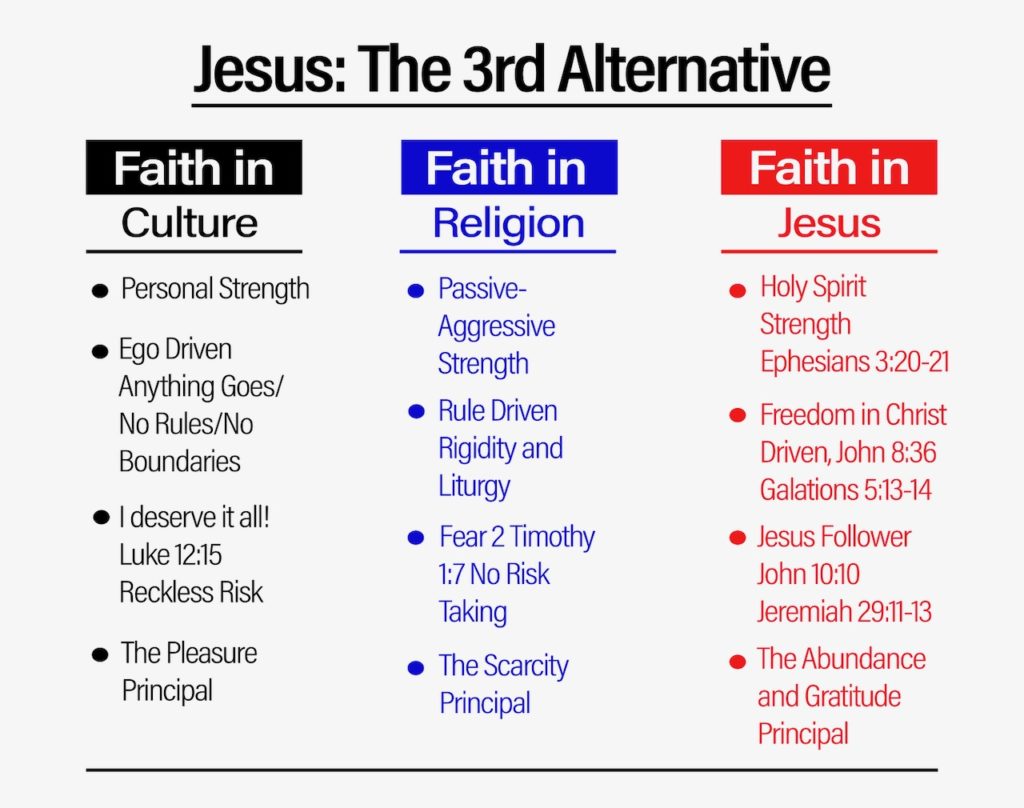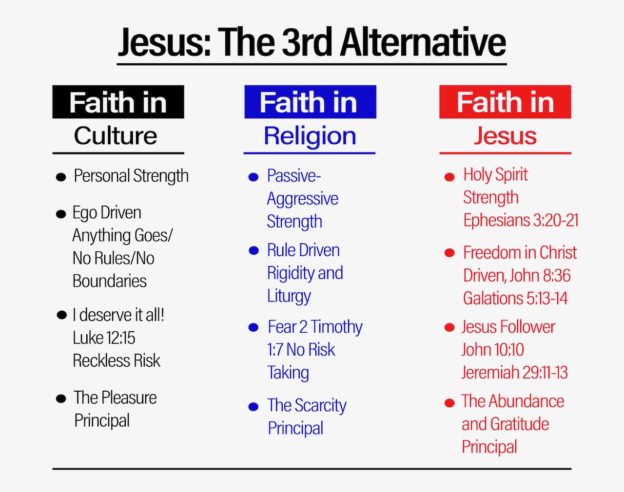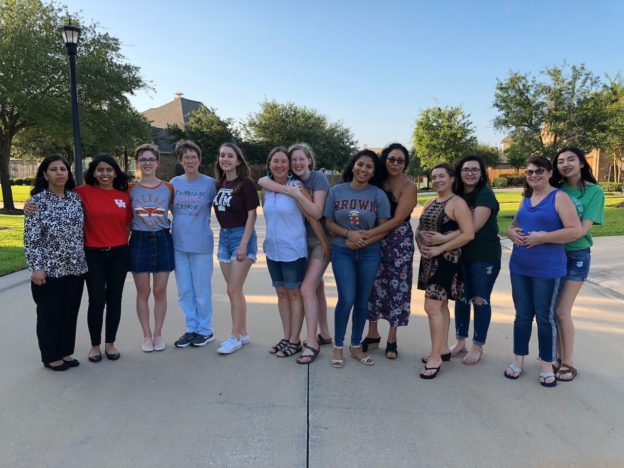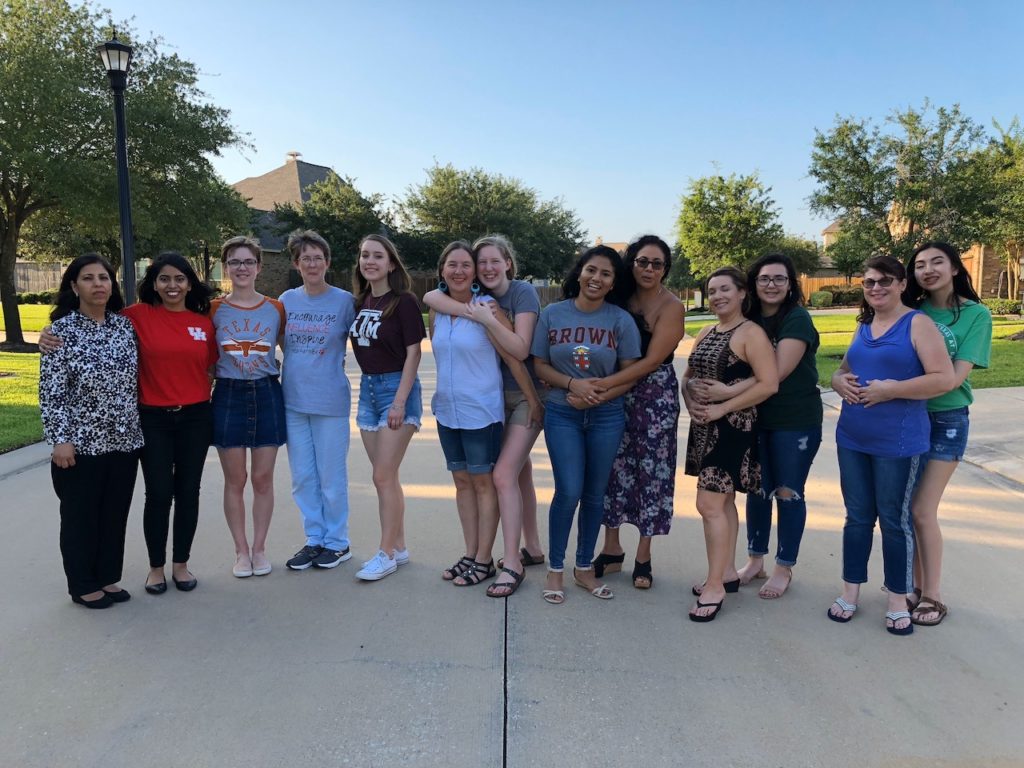Too often the way we live our lives lowers the bar of expectation. We need to remember whose we are. If we live our lives in a way that rises up only as far as is necessary in meeting the standards set by the world around us, (ie ungodly friends or associates, social networking, the media, or sin that entangles us), then not only are we not honoring God’s call in our life but we are cheating ourselves out of the best life He has for us. (John 10:10 ). This goes for all of us, whether you profess Christianity or not. Remember whose we are. Live THAT life. And once we establish that for ourselves, we can more easily make a decision to parent that way as well. Encouraging our kids to live a life free from the tyranny of their culture and a legalistic religion, both of which are void of depth in relationships, will propel them farther in life and toward success than you and I could ever imagine. I would humbly and joyfully submit to you this: You have a 3rd alternative in parenting. You can choose Jesus.

Faith in Culture: Our culture is pushing arrogance and egotism onto our kids at alarming levels. This narcissistic model for teaching empowerment is hardly a worthy prototype for moving our kids towards a life full of healthy relationships and successful and joyful living. This alternative lies to them. But how? By teaching them that they are the center of their universe. That everyone and everything revolves around him! It’s a cruel joke in the end, as soon as they realize they are not the center of the universe. Ambiguity and confusion along with a lack of absolute truth about who they are intrinsically, leads them to real disappointment. A disappointment that fails to encourage service to others, compassion and generosity, truthfulness, and a strong work and leadership ethic. Impulsiveness is the name of the game. Reactive versus proactive. Reckless endangerment of their mental health and sadly, the mental and emotional health of others. “If it feels good, then I can do it,” or “If it feels good, then I can be it,” is the pervading message of our culture. But the world we live in, carefully and strategically, wraps all of this up in a package, which on the outside says something nice about your right to be whoever and whatever you want to be. Indeed, a tenet we have employed in raising our own girls. But not at the expense of teaching them who God says they are first. The problem is when you peel back the layers of this first alternative, you find no person standing in your corner when you’re losing. No one cheering you on when you’re winning. Just a shallow selfless way of living that leaves you alone and empty.
Faith in Religion: Tolerance or Religion VS. Grace. A pastor friend of mine, Dan, once said “Tolerance is a cheep and flimsy virtue compared to robust examples of grace like patience, hospitality, justice, kindness, and love.” Grace is something that falls out of “true religion” that is revealed to us in James 1:27: “Religion that God our Father accepts as pure and faultless is this: to look after orphans and widows in their distress and to keep oneself from being polluted by the world.” Discouraging you from teaching your child to place her faith in religion, does not mean there is no such thing as a conversion experience, a moment we all must have when we commit our lives to Christ. Or else, did Christ die for nothing? No, not at all. But imploring your child to check off all the appropriate boxes in order to save her soul, at the expense of teaching her that true faith is characterized by a personal relationship in Jesus, is flat wrong. Do this, and you can add her to the ever growing list of church casualties that fill the pews of our churches, and the halls of our government offices, schools, and homes. Don’t fall victim to this distorted view of your child’s faith. Jesus wasn’t just a 1st century program for the new covenant church. The bible is the sum of all its parts and more. It is a story about a Savior. And in that story, Jesus was in the beginning, the middle and the end (John 1:1 Revelations 22:13) And that story didn’t end on the island of Patmos at the end of Revelations. Not nearly. This story is still ongoing. We are all part of it. Where do you see yourself in that story? Your answer to that is critical in understanding the need for us to read the bible as seekers and not cavilers. For teaching our kids true faith in Jesus and not just our version of religion.
Faith in Jesus: The exponentially cool thing about teaching your child to place his faith in Jesus, is that Jesus won’t fail him. No we don’t teach a prosperity gospel, or a “hard times will never come to you if you only believe,” gospel. Not even. Faith in Jesus means faith in someONE that never changes, never fails, even when the world or people in your life fail you. And they will. Jesus stands unmovable. “God did this so that, by two unchangeable things in which it is impossible for God to lie, we who have fled to take hold of the hope set before us may be greatly encouraged. We have this hope as an anchor for the soul, firm and secure. It enters the inner sanctuary behind the curtain.” Hebrews 6:18-19
Whether we want to admit it or not, the previous decades leading up to our “here and now” have led our kids down multiple stray paths. Where they choose to place their faith matters. What you teach them about where to place their faith matters. I would ask you to humbly and with an open spirit, consider the faith alternatives I have proposed here. This isn’t something I made up. Nor is it something that will be unfamiliar to you. All I did was put it in perspective in the form of a visual graphic. As parents, early on, (as early as possible), we can choose the 3rd alternative. We can make a decision to point them down a path that allows them to live a life of abundance, even in sorrow and hardship, that the other two reigning alternatives simply cannot do for them. And if you are reading this in the later stages of parenting, stop, take a breath, and regroup. It’s never too late to engage your children with truth coupled with unconditional love. It’s never too late to “Do The Next Right Thing.” It’s never too late to offer them the 3rd alternative: A life with Jesus.
Galatians 5:1 says: “It is for freedom that Christ has set us free. Stand firm, then, and do not let yourselves be burdened again by a yoke of slavery.” If only we could see how those first two alternatives put a strangle hold on our children, a “yoke of slavery,” and how Jesus just wants to set them free from that.


